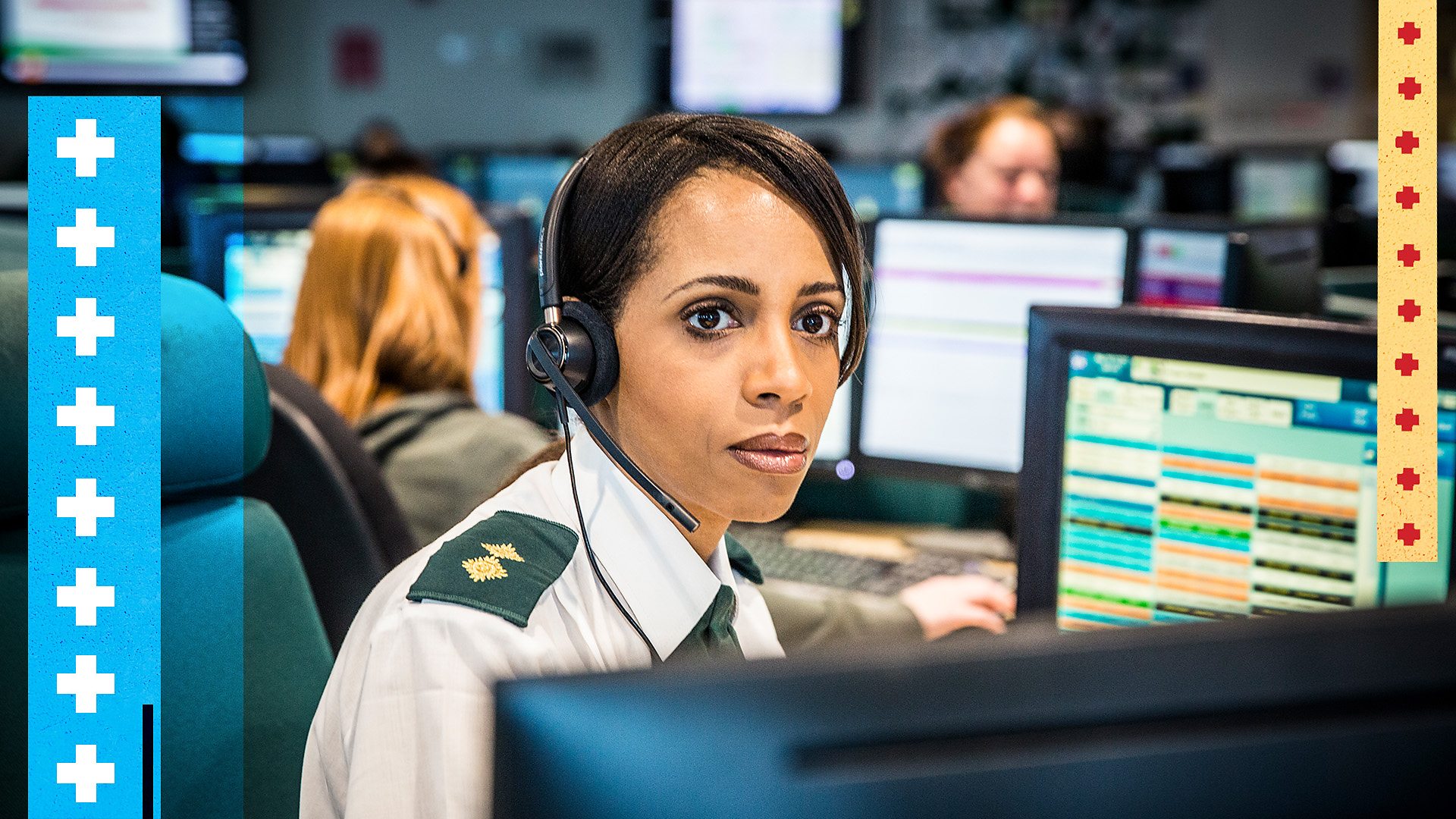From heart attacks to broken nails: Behind the scenes of your 999 calls

- Published
I spent a day in an ambulance control room to find out what it's like
ŌĆ£Is the patient breathing?ŌĆØ
Jamie is calm and confident as he answers the 999 call. I'm sitting next to him in West Midlands Ambulance Service call centre, on the edge of my seat, waiting for the caller to respond.
ŌĆ£I don't know.ŌĆØ
I look over to Jamie in panic. He is completely cool. ŌĆ£Is he responsive?ŌĆØ
There is a moment of silence before the answer comes: ŌĆ£Yes.ŌĆØ
The patient is a 26-year-old man who has been injured playing football. He was unconscious, but he's now awake - and is suffering a dislocated kneecap.
ŌĆ£Has his leg become cold, pale, or blue?ŌĆØ asks Jamie.
ŌĆį©▒▓§.&▒ń│▄┤Ū│┘;
Jamie logs the incident as a category three. Calls to the ambulance service are rated from one to four, with one as the most serious.
He immediately requests an ambulance to the scene. ŌĆ£HeŌĆÖs going to be in agony,ŌĆØ says Jamie grimly as he hangs up. ŌĆ£I hope he isnŌĆÖt waiting long.ŌĆØ
Jamie is a 999 call handler
I am listening in on the 999 call handlers talking to members of the public, while, across the room, the senior dispatch team are communicating directly with the ambulances.┬ĀThey appear in ┤¾Ž¾┤½├Į One's upcoming third series of┬ĀAmbulance, a documentary following both the highly pressurised control rooms and the emergency crews on the street.
The employees range in age from their 20s to their 60s, all wearing headsets and saving lives.
Calm voices ask questions like, ŌĆśIs there blood?ŌĆÖ; ŌĆśHas he had a fit in the last hour?ŌĆÖ; ŌĆśDoes it feel like heŌĆÖs fighting for breath?ŌĆÖ┬Ā
There are big screens depicting the number of calls received - by 1pm, the team has already taken 1,501 phone calls, all answered within an average of 0.2 seconds - and whether any call handlers are free. If the number of available handlers hits zero, a buzzer goes off. Anyone on a non-urgent call is encouraged to say, ŌĆśCall us back if anything changes,ŌĆÖ and hang up ASAP to take the next call.
Jamie is barely off the phone from the football incident when it rings again. ŌĆ£Ambulance services. Is the patient breathing?ŌĆØ
This caller is a GP. HeŌĆÖs just visited an elderly patient after he missed an appointment - ŌĆ£I was worried about him, so I went to see him" - and found he had fallen to the ground in the hallway.
ItŌĆÖs another category three, and Jamie quickly arranges for an ambulance.
Radhika in the control room
Between providing help for people in life-threatening situations - unconscious patients, a teen girl having an asthma attack at school - Jamie tells me about his job. He works 12-hour shifts, and says the days are usually busier than the nights ŌĆō except on payday weekends.┬Ā"When people get paid at the end of the month, they tend to go out and celebrate," explains Jamie. "Which means we can get more calls about alcohol-related incidents."
He personally takes about 350 calls a week. It can be exhausting, but it is also life-affirming. Jamie tells me about a six-year-old boy he saved over the phone. His frantic parent called because he was choking. An ambulance would never have got there in time to save him, so Jamie had to administer instructions over the phone - saving the boyŌĆÖs life.
ŌĆ£It was amazing,ŌĆØ smiles Jamie.
The 999 call handlers can also deliver babies and offer CPR over the phone. These cases are rare, but everyone I speak to has experienced at least one. Some have been negative experiences, of course, but the handlers break into grins telling me about the ones that went well.
The handlersŌĆÖ one universal complaint is nuisance calls. ŌĆ£I had a 22-year-old call me to say sheŌĆÖd broken her nails and needed an ambulance,ŌĆØ sighs one. ŌĆ£You get all sorts. ItŌĆÖs a huge waste of time. You also get your regulars. We have a few elderly patients who call almost daily. WeŌĆÖre always sympathetic about their complaints, but they rarely need ambulances.ŌĆØ
I cross the room to chat to Hollie, whose five computer screens are all flashing with details of the ambulances currently heading out and returning to the hospital.
Hollie with her diamante headset
SheŌĆÖs currently dealing with an ambulance crew who were called to a local restaurant after a man had a cardiac arrest there. He has died, which means she now needs to inform the police, as the death occurred in a public place.
"We've got two crews down there right now and a medical team," she explains. "We'll have to get the coroner's office to inform his relatives, and he'll be taken to the mortuary."
Hollie tunes into her radio to speak to the paramedics at the scene, ending her instructions with a "Roger, thanks."
With that, the radio beeps again, and sheŌĆÖs straight onto the next drama: a teenage girl who has taken a drug overdose is throwing a Stanley knife at the caller. ItŌĆÖs unclear what else is happening, and it sounds incredibly chaotic, but Hollie is unfazed.
ŌĆ£These sorts of things happen all the time,ŌĆØ she says, barely looking up from her screens as her manicured nails tap away.
The phone rings again, and she gets straight back to doing her job, saving lives.
Ambulance is on ┤¾Ž¾┤½├Į One on 26 April at 9pm.